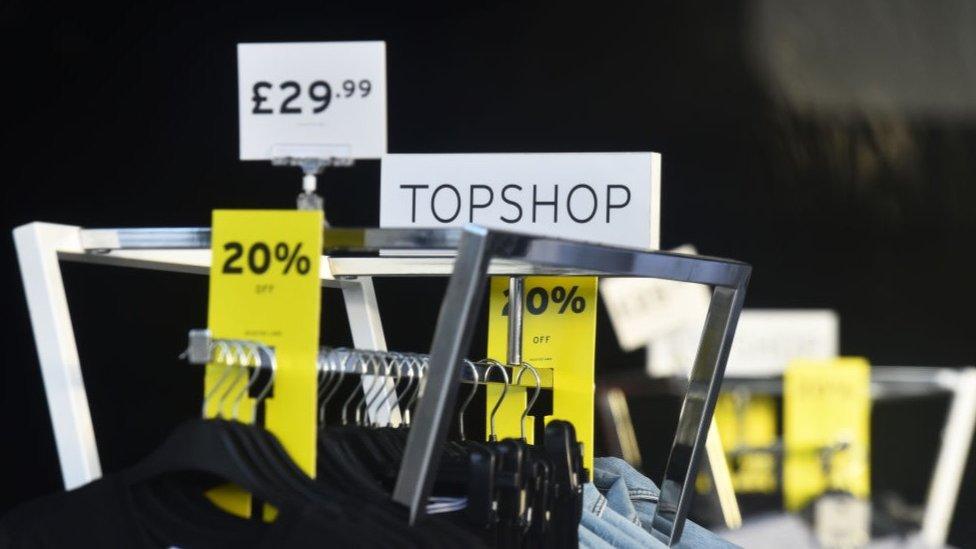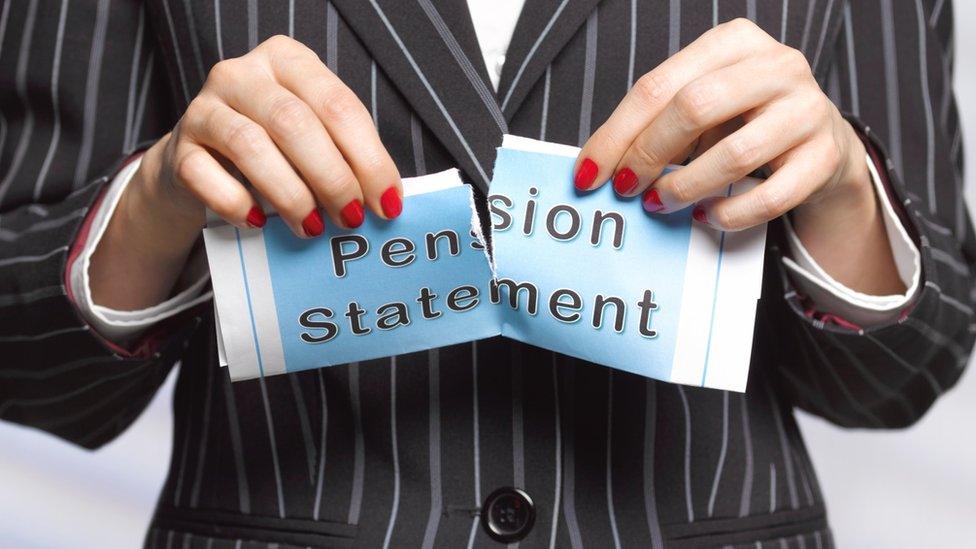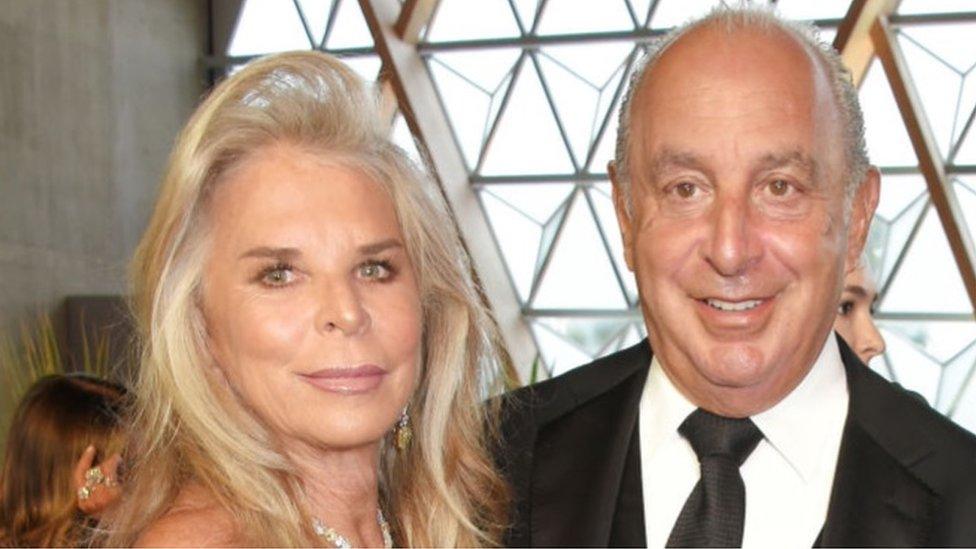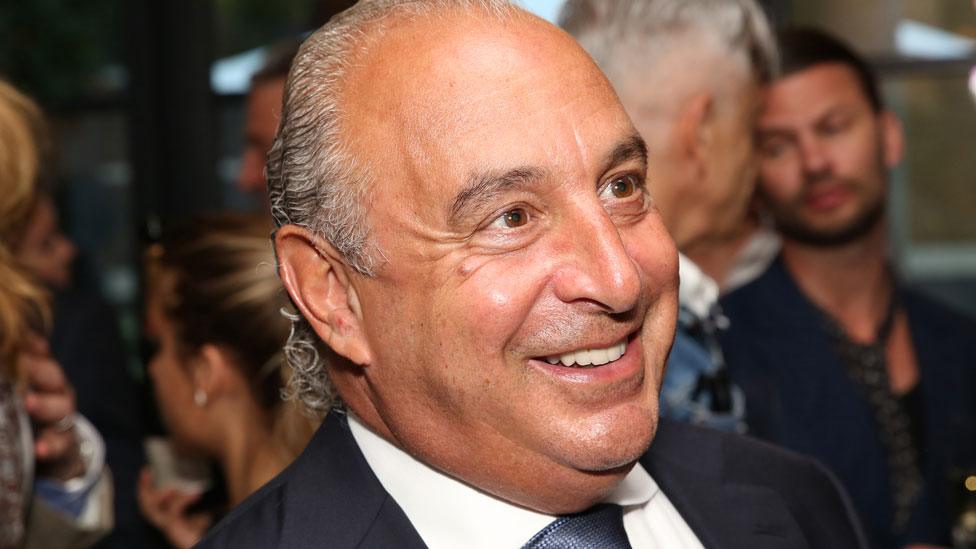Is my pension ruined if a retail empire crumbles?
- Published

The collapse of Topshop owner Arcadia is likely to result in a cut in the value of thousands of shopworkers' pensions.
The retailer's demise has led to calls for Sir Philip Green and Lady Green, who run and own the company respectively, to fill the financial gap.
However, as with any business that goes bust, there is a system in place to protect the majority of pension payouts to ensure staff do not lose out entirely.
What happens to pensions when a business folds?
When you work for a company, you are offered membership of a pension scheme, into which the employer makes a contribution and you add to via your pay.
If that businesses collapses, then the contributions stop. A new owner may take on the pension scheme, or - in many cases - certain types of pension scheme go into a rescue scheme called the Pension Protection Fund (PPF).
It pays pensioners already receiving their company pension, and protects those who have yet to reach pension age.
The PPF is paid for, in part, by a levy on other pension funds.
Do all pensions go into the PPF?
No. Anyone with a defined contribution pension, external has built up a pension pot which belongs to them. This is often managed through a separate investment company and will not go to the PPF.
The individual can decide how it is invested and what to do with it when they reach retirement.
The PPF gets involved with so-called defined benefit pensions, external - when the employer effectively gives a pension promise about how much you will receive at retirement. This is often based on your final salary, or an average of your career salary.
The PPF usually takes on a failed company's pension scheme and makes payments (officially compensation) to its members.
Arcadia's two defined benefit pension schemes are now expected to go into the PPF, after assessors have gone through the books of the schemes.
In a statement, the trustees of the schemes said: "Because Arcadia Group Limited is in administration, the schemes are now expected to enter a Pension Protection Fund (PPF) assessment period.
"The trustees will now liaise closely with the administrators while continuing to work with the Pensions Regulator and the Pension Protection Fund to ensure the best return possible is achieved from asset sales and to make sure the schemes' entry to PPF assessment is as seamless as possible."
How much will pension scheme members get?
That depends on your stage in life.
The PPF promises to pay your pension in full, if you are already receiving pension payments. However, there are some caveats.
The first is that the pension may not increase in value each year as much as expected. This increase is pegged to the rising cost of living as measured by inflation. The PPF uses the Consumer Prices Index (CPI) measure of inflation, which is generally lower than another measure - the Retail Prices Index (RPI) - used by many active pension schemes.
The annual increase only relates to pension accrued since 1997. Any pension built up before that is not increased in line with inflation which is a further blow to older members, and those who worked at the shops more than two decades ago, particularly those who are approaching retirement now.

For people yet to receive their pension because they are too young, or those who have retired early, the PPF only pays 90% of their pension promise when they hit pension age.
There is a cap on how much someone can receive each year. At present, at the age of 65, that limit is £37,315 a year.
Taken together, all this means, on average, a person with a pension administered by the PPF may receive about 75% to 80% of what they would have expected to have received.
What state are the Arcadia pension schemes in?
There are an estimated 10,000 people with defined benefit pensions from Arcadia - the majority in the Arcadia Group Pension Scheme and the rest in the Arcadia Group Senior Executives Pension Scheme.
In recent times, these defined benefit schemes were closed to new members of staff who work for Arcadia's brands such as Topshop, Dorothy Perkins and Burton, so most of those affected are more long-serving workers or people who have left, or already retired.
At present, the pension scheme does not have the money to pay all future pension obligations. This deficit, according to pensions consultant John Ralfe, is £350m. This is large, but not unprecedented.
Some, but not all, of this shortfall can be made up by a £50m promise from Arcadia-owner Lady Green, and by administrators selling certain properties owned by the company, Mr Ralfe said.
Should the Green family pay up?
There have been calls for the Greens to make up the shortfall. If this were to happen, members would receive all of the pension they were promised.

Sir Philip Green and Lady Green have a widely-publicised fortune
Labour MP Stephen Timms, who chairs the Work and Pensions Committee, said: "Whatever happens to the group, the Green family must make good the deficit in the Arcadia pension fund."
This demand is based on what Mr Timms and others would regard as a moral obligation from the Greens who have huge wealth based on a £1.2bn dividend Sir Philip took from Arcadia and paid to his wife, tax-free in 2005.
There is also the backdrop of a scandal when BHS went bust with the loss of 11,000 jobs and a large pension deficit. Sir Philip reached a deal with the Pensions Regulator to inject £363m into that scheme, after having been accused of earlier selling the business for £1 to avoid pension obligations, something he vigorously denied.
This time, at this stage, there appears to be no legal case which could be pursued by the regulator to oblige the Greens to make any further payment into the pension scheme.
The Pension Protection Fund said: "Insolvency events are a concerning time for employees and scheme members and we want to assure the members of Arcadia's defined benefit pension schemes of our ongoing protection. The robust negotiations at the time of the CVA last year have ensured that both schemes are now in a better financial position."
- Published30 November 2020

- Published27 November 2020

- Published26 March
